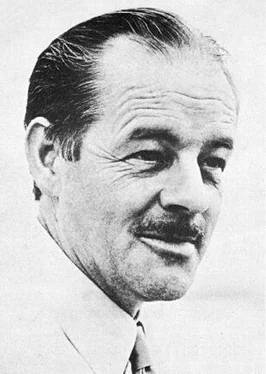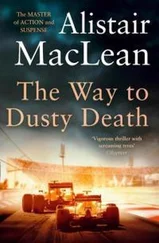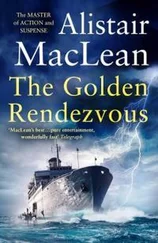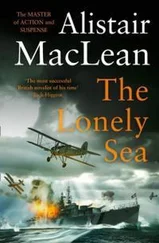The conditions might have been made for me.
The ship was low in the water, the ribbed oil tanks standing high but the gunwale only at waist level. I took a pencil light from my coat and went aboard.
I moved right for’ard in the darkness. Apart from a glimmer from the accommodation aft there was no light at all on board, not even navigation or riding lights: the Christmas tree illuminations of the oil derrick made those superfluous.
There were deep sliding vertical doors giving to the raised fo’c’sle. I pulled the head and foot bolts on one of these, waited for a slight roll of the ship to help and eased the door back a crack, enough for my head, arm and light. Barrels, paint drums, ropes, wood, heavy chains – it was some sort of bosun’s store. There was nothing there for me. I eased the door back, slid in the bolts and left.
I made my way aft over the tanks. There were raised trapdoors with large clips which stuck out at all angles, there were fore-and-aft and athwart-ships pipes of every conceivable size and at every conceivable height, there were valves, big wheels for turning those valves and nasty knobbly ventilators, and I don’t think I missed one of all of those, with my head, kneecaps or shins, on the way aft. It was like hacking your way through a virgin jungle. A metal virgin jungle. But I made it, and I made it with the sure knowledge that there wasn’t a trap or hatch on that deck able to take anything larger than a human being.
There was nothing for me in the stern either. Most of the deck space and superstructure there was given over to cabins: the one big coach-type hatch was glassed in and had a couple of skylights open. I used the flash. Engines. That ruled that hatch out. And the whole of the upper deck.
Andrew was waiting patiently in the dinghy. I felt, rather than saw, his inquiring look and shook my head. Not that I had to shake my head. When he saw me clamping on my rubber skull-cap and oxygen mask that was all the answer he needed. He helped me make fast a life-line round the waist, and it took the two of us a whole minute: the rubber raft was pitching and bouncing about so much that we had one hand for ourselves and only one for the job.
With the closed oxygen circuit the safe maximum depth I could get was about twenty-five feet. The oiler drew perhaps fifteen, so I had plenty in hand. The underwater search for a wire, or for something suspended from a wire, proved far easier than I had anticipated, for even at fifteen feet the effect of the surface swell motion was almost negligible. Andrew paid out, slackened and tightened the life-line to adjust to my every underwater movement as if he had been doing this sort of thing all his working life, which indeed he had. I covered the entire submerged length of the oiler twice, keeping close to the bilge keels on either side, examining every foot of the way with a powerful underwater flash. Halfway along the second sweep I saw a huge moray eel, which writhed out of the darkness beyond the beam of the torch and thrust its head with its evil unwinking eyes and vicious poisonous teeth right up against the glass of the flashlight: I clicked the beam on and off a couple of times and he was gone. But that was all I saw.
I felt tired when I got back to the rubber dinghy and hauled myself aboard. I felt tired because fifteen minutes’ hard swimming in an oxygen outfit would make anybody tired: but I knew too well if I’d found what I’d been looking for tiredness would never have touched me. I’d banked heavily on finding what I’d been looking for in on or under that ship. I felt let down.
I felt tired and low and dispirited and cold. I wished I could smoke. I thought of a crackling wood fire, of steaming coffee and a long long nightcap. I thought of Herman Jablonsky sleeping peacefully in his big mahogany bed back in the general’s house. I stripped off mask and cylinder, kicked the flippers off my feet, pulled on a pair of shoes with numbed and fumbling fingers, flung my pants, coat and hat up on the deck of the oiler and dragged myself up after them. Three minutes later, dressed in my outer clothes and dripping like a blanket that’s just been hauled from a wash-boiler, I was on my way up the enclosed gangway to the well-deck of the oil rig a hundred feet above my head.
Drifting grey cloud had washed the last of the starlight out of the sky, but that didn’t help me any. I’d thought the overhead lamp illuminating the gangway had been weak, but it hadn’t, it had only been distant. By the time I was ten feet from the underside of the platform it was a searchlight. And if they kept a gangway watch? Did I tell them I was the Second Engineer from the oiler and was suffering from insomnia? Did I stand there and spin a plausible story while the moisture dripping down under my pants from the diving-suit formed a pool of water under my feet and my vis-à-vis examined with interest the ruched high-necked glistening rubber where my collar and tie ought to have been? I had no gun, and I was prepared to believe that anyone in any way associated with General Ruthven and Vyland pulled on his shoulder holster before his socks when he got up in the morning: certainly everyone I’d met so far had been a walking armoury. And if a gun were pulled on me? Did I start running down a hundred and thirty steps while someone picked me off at their leisure? Of course I didn’t have to run, the fire-escape gangway was only enclosed on three sides, but the fourth opened seawards and I wouldn’t bounce far off that maze of valves and pipes on the oiler below. I concluded that any halfway intelligent man would have gone straight back down.
I went right on up.
There was no one there. The gangway emerged in an alcove closed off on three sides – by the railed platform edge on one side, by high steel walls on the other two. The fourth side gave directly on to the well-deck where the crane was. What little I could see of this well was brightly illuminated and I could hear the clank of machinery and the voices of men not thirty feet away. It didn’t seem like a good idea to wander straight out into their midst so I looked for another way out. I found it at once, a set of steel rungs built into one of the twelve-foot high steel bulkheads by my side.
I went up those, flattening myself out as I went over the top, crawled a few yards then stood up behind the shelter of one of the huge pillars. I could see the whole panorama of the oil rig now.
A hundred yards away, on the larger raised platform, to the north, was the derrick itself, looking more massive than ever, with control cabins at its base and men moving around: under the surface of that platform, I supposed, would be the power-generating machinery, the living accommodation. The smaller platform to the south, the one on which I stood, was almost completely bare with a semi-circular extension reaching out over the sea to the south. The purpose of this large cleared space baffled me for a moment and then something clicked in my memory: Mary Ruthven had said that the general normally commuted between oil-rig and shore in his helicopter. The helicopter would need a landing-ground. This was it.
On the well-deck between the two platforms, almost at my feet, men were moving large barrels with the aid of a tracked crane, trundling them into a brightly-lit opening half-way along the high bulkhead on the northern platform. Oil would be piped aboard, so those barrels could only be ‘Mud’, a chemical mixture of barites used for forcing down under pressure the cement that formed the outer casing of the drill hole. There was a whole series of those big storage sheds, most of them open, extending right across the width of the rig. There, if anywhere, would be what I was looking for.
I crossed to the far side of the south platform, found another set of rungs and dropped down to the well-deck. There was nothing to be gained by caution or stealth now; apart from the fact that they would only excite suspicion, the time factor was becoming all-important: with the weather steadily worsening – the wind now seemed twice as strong as it had been half an hour previously and it wasn’t just a factor of the height – Captain Zaimis would be climbing up the mast. Perhaps he might even be forced to take off without me. But there was no future in that thought and certainly none for me. I put it out of my mind and crossed to the first of the storage bays.
Читать дальше
Конец ознакомительного отрывка
Купить книгу












